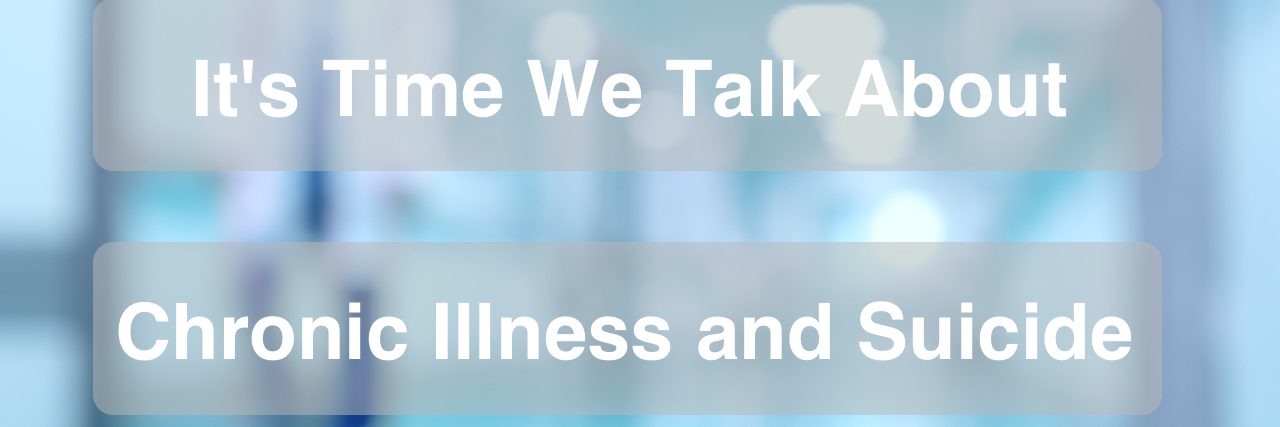Every year, approximately 44,193 Americans die by suicide. While many suicide-related deaths are linked to mental illness, a new study shows that having a chronic illness can increase suicide risk as well.
According to a study published in the American Journal of Preventive Medicine, having a chronic illness increases the risk of dying by suicide, and for those living with multiple conditions, the risk is even greater.
Researchers looked at the health records of 2,674 individuals who died by suicide between 2000 and 2013. From those records, 19 chronic conditions were identified and the number of people who died by suicide having those conditions was compared to the medical records of 267,400 people. Conditions studied included diabetes, cancer, migraines, epilepsy and asthma. For 17 of the 19 conditions selected, the risk of suicide was increased. Of the 17, traumatic brain injuries, HIV and AIDS and sleep disorders carried the highest risk.
“This study really supports the idea that having one or more physical health conditions increases risk for suicide.,” the study’s lead researcher Brian K. Ahmedani, PhD, LMSW told The Mighty. “These main findings suggest that suicide may be linked to overall burden of disease or health rather than to any single condition, even though the association was particularly strong with a few conditions.”
If You Are Living With a Chronic Illness
While chronic illness can increase the risk of dying by suicide, mental health professionals note there is help out there for those living with a chronic illness who are struggling with suicidal thoughts. “Chronic illness is a daily stressor that may not go away, so it would be unusual for it not to affect mental health and well-being, at least at times,” Marisol Hanley, PhD, a psychologist in Seattle who lives with lupus, told The Mighty. “You should not beat yourself up for having emotional difficulty sometimes and not always having a positive attitude.”
There are many challenging aspects of chronic illness, especially when caring for yourself becomes as demanding as a part- or full-time job. “Usually it’s the diseases that require a lot of health care on the part of the patient that carry a higher risk [of suicide],” said Daphna Shiffeldrim, MD, MPH, a New York City psychiatrist who works primarily with patients, like herself, living with diabetes.
Beyond increasing the risk of suicide, having a chronic illness also makes you more likely to have a mental illness. “Usually chronic illness carries higher rates of psychiatric comorbidity such as depression and anxiety,” Shiffeldrim said. “It’s not just that if you have a chronic illness you have a higher rate of suicide, but you have a higher rate of probably having depression, and therefore, leading to having suicidal thoughts.”
If you are having a hard time coping with your disease or symptoms of your condition — like fatigue or brain fog — make you feel less like yourself, it can be hard to distinguish a mental illness such as depression from any physical symptoms you may be experiencing. Depression can appear in ways beyond feeling sad, especially if you live with an illness. For those with diabetes, Shiffeldrim said, depression can present itself as uncontrolled blood sugar.
“A lot of [people] aren’t aware of what depression really looks like,” said Nicole Reynolds, PsyD, a psychologist treating those with chronic illness in New York City. “They think it’s only feeling sad, but there are a lot of other symptoms that encompass clinical depression.” Other signs of depression can include changes in appetite, self-esteem issues, changes in your sleep pattern and fatigue.
Oftentimes, your doctor will screen for depression during your exam, Reynolds said, but this doesn’t always happen. “If in doubt, if you’re concerned about being depressed, it’s best to at least sit down with someone to have the conversation,” she added. “Therapy can be beneficial regardless, whether it’s isolated depression or chronic illness. ”
The Value of a Strong Support System
Whether it is reaching out to family and friends, attending a support group or seeing a therapist, a strong support system can help you through difficult times.”In my perspective, I think anyone could use some support, in general during their medical appointments and during their medical crises especially,” Reynolds said.
For those who need more help, individual therapy can be a great resource. “Try to look for a therapist who has familiarity with health issues,” Hanley advised. “Going to talk to someone when you are newly diagnosed or still in the process of diagnosis can help work through the grief and adjustment period.”
There is also no shame in seeking psychiatric help. “Medication for mental health, like antidepressants, can be a useful tool for some people,” Hanley added. If you are prescribed an antidepressant or other medication, make sure you understand how it will interact with any other medications you may be taking, she advised, and don’t change or start more than one medication at a time.
If you are having suicidal thoughts, you can reach out for help by contacting a suicide hotline or crisis prevention center. “Most people don’t want to die, they just want the pain to stop,” Hanley said. For suicidal thoughts brought on by flares or periods of intense pain, Hanley recommends speaking with your doctor about pain management.
Managing a chronic illness is difficult, and it is OK to feel tired or have moments where you grieve. “Instead of fighting your feelings, you can think of strong emotions, even despair and hopelessness, as waves,” she said. “If you let the wave pass through, you come out the other side. These feelings are normal, and you are not alone.”
If you or someone you know needs help, visit our suicide prevention resources page.
If you need support right now, call the National Suicide Prevention Lifeline at 1-800-273-8255, the Trevor Project at 1-866-488-7386 or text “START” to 741-741. Head here for a list of crisis centers around the world.

